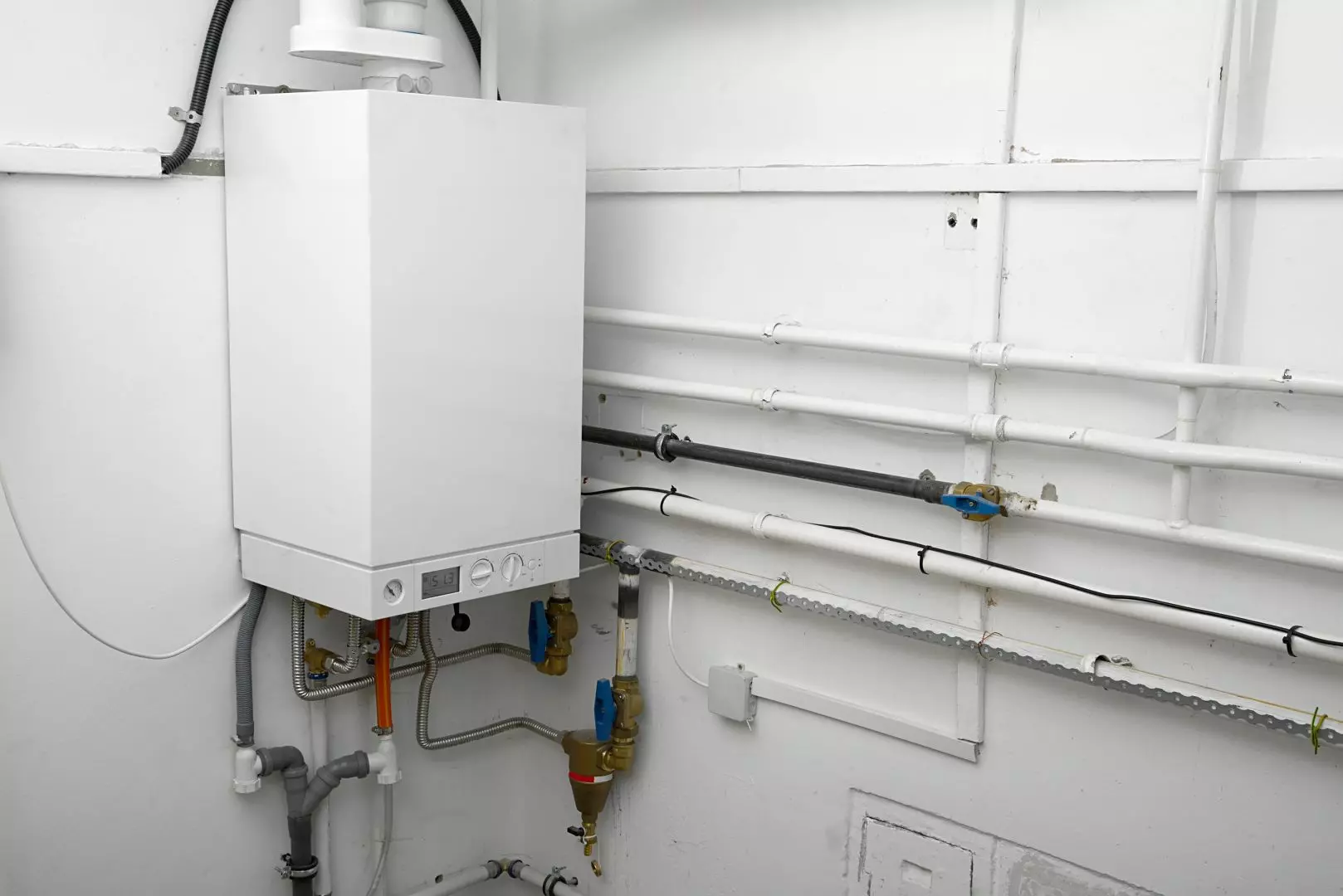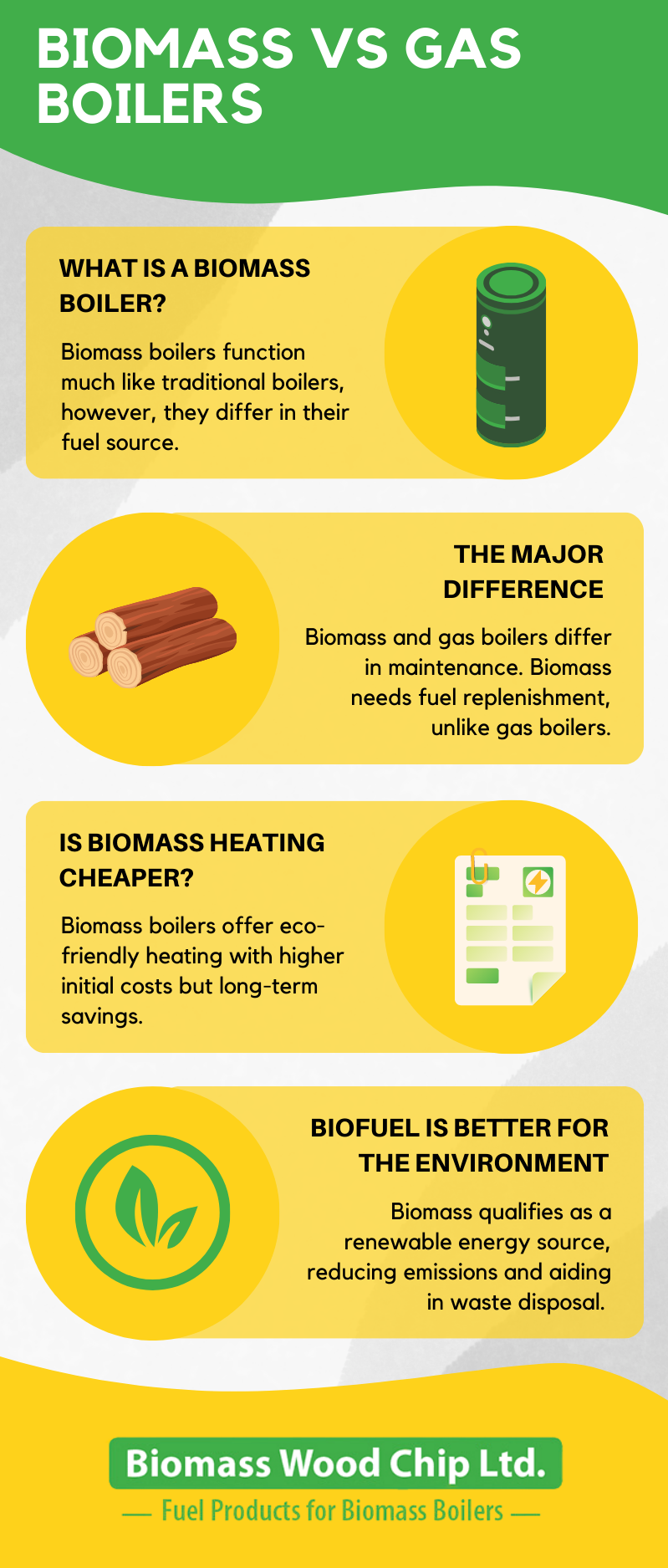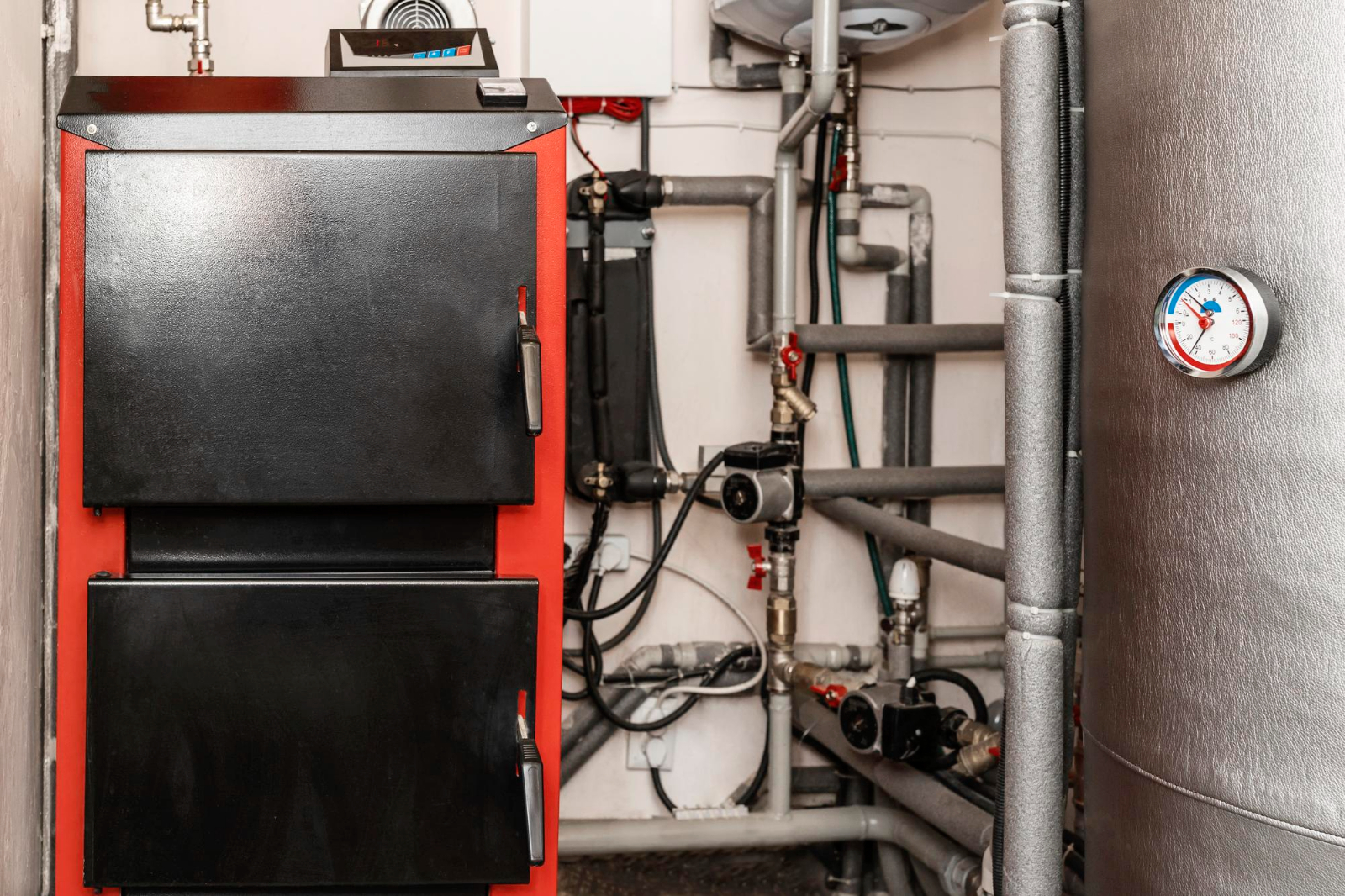Are you considering the benefits of biomass boilers over gas boilers? This article looks at biomass vs gas boilers and helps you understand the differences between them.
What Is A Biomass Boiler?
Biomass boilers function much like traditional boilers, providing heat to your home; however, they differ in their fuel source, which is derived from wood in the form of pellets, chips, and logs.
For domestic biomass heating, many homeowners opt for wood pellets due to their widespread availability. The biomass boiler burns these wood pellets, generating hot water that circulates to radiators, taps, and showers, ensuring a comfortable and cosy living environment throughout the year.
Biomass boilers are available in two main types: manual top-up and automated feed hopper. With a manual top-up boiler, you'll add wood fuel as needed. In contrast, the automated feed hopper system supplies the boiler with wood at regular intervals, determined by your preference.
Maintaining a biomass boiler is relatively straightforward. Regular top-ups of wood fuel are required, and you'll need a suitable storage space for your supply of wood. Additionally, you can program the boiler to operate at specific times that suit your schedule.
Periodically, around once per month, you'll need to empty the ash from the boiler. The ash can be further utilised by adding it to your compost pile, contributing to the enhancement of your garden's growth.
Biomass boilers offer an environmentally friendly heating option, utilising renewable wood resources, which reduces carbon emissions. By adopting a biomass boiler, homeowners not only enjoy a sustainable heating solution but also contribute to the preservation of our environment for future generations.
The Major Differences Between Gas And Biomass Boilers
When making decisions about home heating, it is essential to understand the key distinctions between gas and biomass boilers, particularly regarding efficiency and maintenance.
Both biomass and gas boilers are known for their high efficiency, ensuring optimal energy utilisation in heating operations.
Biomass boilers typically operate at an efficiency level of 89% to 91%. Noteworthy examples include the Trianco Greenflame with an impressive 91% efficiency and the Angus Orlingo 500 reaching an even higher 92% efficiency.
Similarly, top-rated gas boilers demonstrate comparable efficiency levels, ranging from 88% to 91%. For instance, the Baxi Duo-tec HEA achieves an efficiency rating of 91%, while the Valiant Ecotec Plus series surpasses 91%.
This reveals that biomass boilers stand on par with conventional gas boilers in terms of efficiency, providing a reliable and sustainable heating solution.
One significant divergence between biomass and gas boilers lies in their maintenance demands. Biomass boilers necessitate periodic fuel replenishment to sustain their operation.

Gas Boiler

Biomass Boiler
For example, the Baxi Bioflo biomass boiler requires refuelling every 3 to 4 days, while larger biomass boilers equipped with auto-feed hoppers demand refuelling only every couple of weeks.
Additionally, during the combustion process, biomass boilers produce ash, which accumulates approximately 0.5% to 1.5% of the boiler's weight. Proper maintenance entails regular ash removal to ensure the boiler's efficiency.
In contrast, gas boilers are celebrated for their low-maintenance nature, operating on an "install and forget" basis, requiring minimal intervention once installed.
When comparing gas and biomass boilers, both demonstrate remarkable efficiency in heating homes. Biomass boilers, utilising sustainable biomass fuels, prove to be on par with conventional gas boilers in terms of efficiency.
However, the crucial difference emerges in maintenance requirements, as biomass boilers necessitate periodic fuel refilling and ash removal, while gas boilers offer a hassle-free experience in this aspect.
Therefore, homeowners should consider their preferences, lifestyle, and environmental goals when selecting between gas and biomass boilers for their heating needs. Ultimately, both options provide reliable heating solutions, and the choice depends on individual circumstances and priorities.

Is Biomass Heating Cheaper?
Biomass boilers provide a more cost-effective approach to heat generation compared to oil, coal, and electric alternatives. Currently, the average annual costs of biomass heating are comparable to gas heating. However, with the uncertain future of fossil fuels, biomass boilers may emerge as the most economical option in the long term.
Choosing biomass boilers can prove advantageous if you seek a budget-friendly and environmentally conscious heating solution, especially for new construction projects beyond 2025, as gas-fired boilers might no longer be permitted in new-built homes.
Keep in mind that biomass boilers typically entail higher initial costs, potentially up to five times more than gas-fired boilers. While certain financial assistance schemes exist to offset these costs, they are rapidly depleting, with limited options available after 2022.
Furthermore, operating and maintaining biomass boilers may require more effort and consideration than traditional boilers. Additionally, these units and their fuel storage necessitate additional space within your property.
Biomass boilers offer a promising avenue for cost-effective and eco-friendly heating. While they may entail higher initial investments, the potential for long-term savings and environmental benefits makes them an attractive choice for homeowners seeking efficient and sustainable heating solutions.
Nonetheless, careful consideration of the initial costs, operational requirements, and available financial assistance will be crucial in making an informed decision regarding the suitability of biomass boilers for your specific needs and preferences.
Biofuel Is Better For The Environment
Biomass, as a source of energy, stands out for its environmentally friendly attributes. Unlike coal, which takes an extensive period to regenerate, biomass qualifies as a renewable energy source. Its sustainability stems from the relatively rapid growth of new plants or trees, making it a responsible and renewable alternative.
Furthermore, biomass is hailed as a carbon-neutral form of energy. During the burning process, the same amount of carbon dioxide released is later re-absorbed by growing plants, achieving a balanced carbon cycle. This characteristic makes biomass a highly sustainable choice for energy production.
Notably, biomass serves a dual purpose by not only supplying us with energy but also aiding in the disposal of wood and other material waste. This enables us to harness energy efficiently while contributing to waste management and ecological balance.
In the context of heating systems, replacing coal or electric systems with biomass boilers yields significant environmental benefits. By adopting biomass, you can reduce your carbon dioxide emissions by up to 9.5 tons annually. This reduction in greenhouse gas output demonstrates the substantial positive impact that embracing biofuel can have on the environment.
Biomass emerges as a remarkable and eco-conscious energy source. Its renewability, carbon-neutrality, and waste-disposal contributions make it a responsible choice for sustainable energy generation. By transitioning to biomass boilers, we not only secure an efficient heating solution but also play an active role in reducing carbon emissions, thereby safeguarding our environment for future generations.
Should I Choose A Biomass Or Gas Boiler?
When deciding between biomass and gas boilers, several factors come into play to make an informed choice.
1
System Efficiency
Efficiency is a crucial consideration when comparing biomass and gas boilers. Biomass boilers boast an efficiency of approximately 89 to 91%, while top-rated gas boilers closely follow with an energy efficiency output of 88 to 91%. This indicates that both options excel in terms of effectiveness, making them viable choices for efficient heating solutions.
2
Overall Maintenance
Maintenance and servicing requirements play a significant role in the longevity and performance of your heating system. Gas boilers are renowned for their low-maintenance characteristic, often referred to as an "install and forget" technology.
However, with biomass boilers, regular maintenance is essential and recommended on a yearly basis. Proper servicing ensures optimal performance, lower power consumption, and a reduced carbon footprint. Although routine maintenance is necessary for biomass boilers, the long-term benefits they offer make it a valuable investment.
3
Right Boiler Size
Biomass boilers are typically larger in size compared to conventional gas boilers, especially if they are equipped with an auto-feed option. Additionally, biomass boilers require a separate fuel supply, necessitating installation close to the supply source and a dedicated storage facility for the fuel.
4
Environmental Credentials
The environmental impact of biomass and gas boilers is a subject of ongoing debate. While gas used in conventional boilers originates from the breakdown of prehistoric plant matter, the process takes millions of years and is neither sustainable nor renewable.
In contrast, biomass boilers operate on biomass fuels derived from fuel grasses and quick-growing trees. Biomass is considered carbon neutral since trees absorb carbon dioxide and release the same amount when burned, making it an environmentally friendly option.
Whether you need wood chips for landscaping, gardening, playgrounds, or biomass fuel, our diverse product offerings cater to all your needs. We are your new trusted destination for top-notch wood chip services in the North West.






